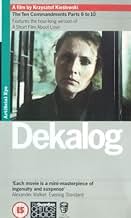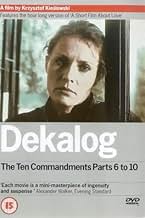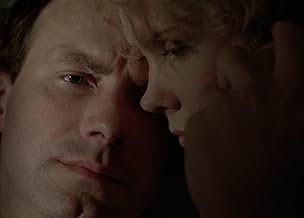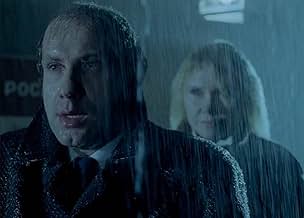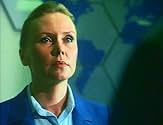Dekalog, dziewiec
- Episode aired Jun 29, 1990
- TV-MA
- 1h
IMDb RATING
8.0/10
3.9K
YOUR RATING
Following the discovery of his sexual impotence, a man urges his wife to take a lover.Following the discovery of his sexual impotence, a man urges his wife to take a lover.Following the discovery of his sexual impotence, a man urges his wife to take a lover.
- Director
- Writers
- Stars
- Director
- Writers
- All cast & crew
- Production, box office & more at IMDbPro
8.03.8K
1
2
3
4
5
6
7
8
9
10
Featured reviews
A compressed domestic tragedy founded on impotence
Eventually, this episode from the DEKALOG series will take on a life of its own. Beginning with a melodramatic premise-- a successful young doctor afflicted with irremediable impotence instructs his loving wife to take a lover-- Kieslowski constructs a 50 minute drama of extraordinary impact, the end of which is an affirmation of their marriage as a spiritual state these partners only half-perceive themselves. I called the film tragic above, but its arc parallels Shakespeare's late romance, THE WINTER'S TALE, right down to a near-miraculous conclusion. A lovely piece of work.
10Aquilant
The drama of a married couple driven to despair
To my way of thinking, what really makes this episode of "Dekalog 9" ("Thou shalt not covet thy neighbour's wife") very singular is the fundamental importance ascribed to dialectics between sex and love applied to the theme of transgression and violation of the bond of conjugal fidelity. The drama of a married couple driven to despair and harassed by problems not easy to solve floats before our eyes in a disturbing way. The gravity of the situation cannot be underestimated, even if the two of them are still linked together by a close bond of affection.
Kieslowski doesn't show any scruples about following Hanka's and Roman's despairing thoughts in the course of their restless, toiling existence and carries out his purpose by a series of very frequent close ups, using long focal length zoom lens, enveloping the two characters in a sort of crude grazing lighting, showing up faces furrowed with wrinkles, placing their features in anything but a favorable light, casting a gloomy shadow over their future, almost prefiguring the uncertain life of the soul kept aside for them. He looks mercilessly into their pale and strained faces, revealing false pretenses mingled with an indefinite sense of guilt, ready to expose their congenital hypocrisy, to dismantle every misleading sense of security. Truly determined to penetrate the defensive shield erected around the married couple, Kieslowski finds out painful scars of time concealed into the folds of their skin worn away by perpetual stress in their marriage, violates the privacy of their facial features revealing all their disarming vulnerability, all their secret consistency of pure mirrors of souls double-crossing each other.
In this embarrassing situation where the impurity of deviating thoughts finds its barycenter in ill-concealed impulses of jealousy, a particular mention goes to the directorial use of the phone, invested with the task of unmasking every ambiguous situations and gratified with many meaningful close ups. Once again the director takes delight in evoking a suggestive game of mirrors in the successful attempt of rendering with great evidence the sense of estrangement and the ambiguous atmosphere of the story. He redoubles the nervous tension due to the dialectic game of two lonely souls with their nerves on the edge, with their barren make-believe opportunely unmasked for the benefit of the audience. Even if the doubtful transgression of the ninth commandment is perceived vaguely, the ninth episode of the "Dekalog" is one of the most significant of the whole series, full of inmost Bergmanian suggestions. And already one can perceive clear premonitory echoes of "The double life of Véronique" between the folds of this story.
Kieslowski doesn't show any scruples about following Hanka's and Roman's despairing thoughts in the course of their restless, toiling existence and carries out his purpose by a series of very frequent close ups, using long focal length zoom lens, enveloping the two characters in a sort of crude grazing lighting, showing up faces furrowed with wrinkles, placing their features in anything but a favorable light, casting a gloomy shadow over their future, almost prefiguring the uncertain life of the soul kept aside for them. He looks mercilessly into their pale and strained faces, revealing false pretenses mingled with an indefinite sense of guilt, ready to expose their congenital hypocrisy, to dismantle every misleading sense of security. Truly determined to penetrate the defensive shield erected around the married couple, Kieslowski finds out painful scars of time concealed into the folds of their skin worn away by perpetual stress in their marriage, violates the privacy of their facial features revealing all their disarming vulnerability, all their secret consistency of pure mirrors of souls double-crossing each other.
In this embarrassing situation where the impurity of deviating thoughts finds its barycenter in ill-concealed impulses of jealousy, a particular mention goes to the directorial use of the phone, invested with the task of unmasking every ambiguous situations and gratified with many meaningful close ups. Once again the director takes delight in evoking a suggestive game of mirrors in the successful attempt of rendering with great evidence the sense of estrangement and the ambiguous atmosphere of the story. He redoubles the nervous tension due to the dialectic game of two lonely souls with their nerves on the edge, with their barren make-believe opportunely unmasked for the benefit of the audience. Even if the doubtful transgression of the ninth commandment is perceived vaguely, the ninth episode of the "Dekalog" is one of the most significant of the whole series, full of inmost Bergmanian suggestions. And already one can perceive clear premonitory echoes of "The double life of Véronique" between the folds of this story.
Moribund Melodramatic Over-reaction
Surgeon reacts to a diagnosis of impotence as if it were a terminal illness, urging his wife to take a lover and plunging into suicidal depression. His wife, however, is willing to live with the diagnosis and swears to a love above and beyond sex, which he rejects, at first; the movie is about his struggling with and final acceptance of this Platonic ideal. Jealousy leads him to spy on and covet his own wife, ergo the commandment. But this only humiliates him further. In a parallel, somewhat superfluous plot, a young female patient asks his advice about a risky operation which would enable her to sing, her life's dream. Both face the same dilemma of whether or not to accept a physical limitation which deprives them of their life's passion. Unlike him, the young woman is willing to live with her disease and forego singing. He changes her mind.
I thought the surgeon and the film, both, over-reacted to the diagnosis, assigned too much weight to it. The melodramatic lack of perspective makes the movie as moribund as its subject matter. Of course, it's amply color coded; the passing stranger in white rides by again; and, again, there's lapse of credibility: the surgeon shares a cigarette with the patient who is supposed to have a disease so debilitating as to prevent her from singing--this makes no sense. But, once again, K. knows how to make the final scene count, canceling earlier shortcomings, at least for a moment.
Overwrought arty soap opera.
By this stage of the series one is right to be more than a little weary and wary of having the same heart strings tugged on to play the same melancholy tune.
I thought the surgeon and the film, both, over-reacted to the diagnosis, assigned too much weight to it. The melodramatic lack of perspective makes the movie as moribund as its subject matter. Of course, it's amply color coded; the passing stranger in white rides by again; and, again, there's lapse of credibility: the surgeon shares a cigarette with the patient who is supposed to have a disease so debilitating as to prevent her from singing--this makes no sense. But, once again, K. knows how to make the final scene count, canceling earlier shortcomings, at least for a moment.
Overwrought arty soap opera.
By this stage of the series one is right to be more than a little weary and wary of having the same heart strings tugged on to play the same melancholy tune.
'Dekalog': Part 9- Sex, jealousy and faithfulness and the sanctity of contentment
'Dekalog' is a towering achievement and a televisual masterpiece that puts many feature films to shame, also pulling off a concept of great ambition brilliantly. Although a big admirer of Krzysztof Kieślowski (a gifted director taken from us too early), and who has yet to be disappointed by him, to me 'Dekalog' and 'Three Colours: Red' sees him at his best.
All of 'Dekalog's' episodes have so many great things, and it is an example of none of the lesser episodes (my least favourite being the still very good Episode 8) being bad. This is testament to the high quality of 'Dekalog' as an overall whole and how brilliant the best episodes are.
Episode 9 is yet another great one from 'Dekalog'. The story is one of the slighter ones of the series, but that is by no means a flaw. My only complaint is the middle act dragging a little bit, otherwise Episode 9 is great stuff while falling short of being one of the best 'Dekalog' stories like Episodes 1, 4, 5 and 6.
As per usual, it is exceptionally well made. The production values in Episode 9 are as ever atmosphere-enhancing, beautiful and haunting to look at and fascinating, definitely cannot be faulted on the technical front. The direction is quietly unobtrusive, intelligently paced and never too heavy, and the music is suitably intricate.
Characters are interesting, well-developed and feel like real people in a compelling sense. The story is thematically rich with much to say about its central conflict of sexuality and love. They are explored intelligently without descending into heavy-handedness, and the episode is powerfully moving, thought-provoking and life-affirming. The acting is superb as to be expected, with complexity and nuances by the bucket-load.
All in all, great 'Dekalog' episode but not one of the series' finest. 9/10 Bethany Cox
All of 'Dekalog's' episodes have so many great things, and it is an example of none of the lesser episodes (my least favourite being the still very good Episode 8) being bad. This is testament to the high quality of 'Dekalog' as an overall whole and how brilliant the best episodes are.
Episode 9 is yet another great one from 'Dekalog'. The story is one of the slighter ones of the series, but that is by no means a flaw. My only complaint is the middle act dragging a little bit, otherwise Episode 9 is great stuff while falling short of being one of the best 'Dekalog' stories like Episodes 1, 4, 5 and 6.
As per usual, it is exceptionally well made. The production values in Episode 9 are as ever atmosphere-enhancing, beautiful and haunting to look at and fascinating, definitely cannot be faulted on the technical front. The direction is quietly unobtrusive, intelligently paced and never too heavy, and the music is suitably intricate.
Characters are interesting, well-developed and feel like real people in a compelling sense. The story is thematically rich with much to say about its central conflict of sexuality and love. They are explored intelligently without descending into heavy-handedness, and the episode is powerfully moving, thought-provoking and life-affirming. The acting is superb as to be expected, with complexity and nuances by the bucket-load.
All in all, great 'Dekalog' episode but not one of the series' finest. 9/10 Bethany Cox
Dekalog 9
This is one of the most potent Dekalogs for a while. The setup is one of those brilliant Kieslowski touches of sending us echoes that we're uncertain if from a hazy future or from inside the soul. He had plans to turn this into a third Short Film but gave up after exhaustion.
A husband discovers he's unable to have children, the doctor suggesting divorce, the end of his marriage. This is interlaid with shots of the wife back home looking for him in an empty apartment. There's a desolate sense between the two of them, something lost along the way and no one looked for it to put it back in. They lay on the same bed now, he has shared the news, and suggests she takes up an affair.
But is all of this, as in film noir, a dreamlike urge of pushing her away from him, or deep down wanting to? At the hospital where he works we get the sense that he's fascinated by a young patient who has a lovely voice but her heart might give way if she becomes a singer. She is content to not pursue this love.
So there is something, the Kieslowskian touch as I am discovering with these Dekalogs, of elusively inhabiting something that's been laying in wait and opens chasms in who these characters are. What we see may be what she's thought about before in a marriage that was draining itself away.
But then it slowly drains itself away. It sets itself up for formulaic surprises where now the boyfriend shows up where she went on a trip and he finds out and is heartbroken. We have what's by now a very typical tension in the series. If you have seen previous Dekalogs in a row, like I did, this will be slight by now.
A husband discovers he's unable to have children, the doctor suggesting divorce, the end of his marriage. This is interlaid with shots of the wife back home looking for him in an empty apartment. There's a desolate sense between the two of them, something lost along the way and no one looked for it to put it back in. They lay on the same bed now, he has shared the news, and suggests she takes up an affair.
But is all of this, as in film noir, a dreamlike urge of pushing her away from him, or deep down wanting to? At the hospital where he works we get the sense that he's fascinated by a young patient who has a lovely voice but her heart might give way if she becomes a singer. She is content to not pursue this love.
So there is something, the Kieslowskian touch as I am discovering with these Dekalogs, of elusively inhabiting something that's been laying in wait and opens chasms in who these characters are. What we see may be what she's thought about before in a marriage that was draining itself away.
But then it slowly drains itself away. It sets itself up for formulaic surprises where now the boyfriend shows up where she went on a trip and he finds out and is heartbroken. We have what's by now a very typical tension in the series. If you have seen previous Dekalogs in a row, like I did, this will be slight by now.
Did you know
- TriviaKieslowski and co-screenwriter Krzysztof Piesiewicz expressed an affection for the character of the young singer who contemplates surgery, and they lamented the fact that there was little for her to do in this story. When they began writing "The Double Life of Veronique", they remembered the plight of the singer in Dekalog--how her passion was limited by her sickness--and transferred this storyline to the characters of Veronique and Weronika.
- ConnectionsReferenced in Three Colors: Red (1994)
Details
Contribute to this page
Suggest an edit or add missing content

